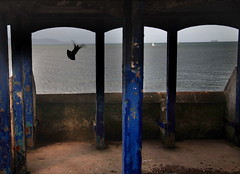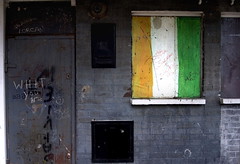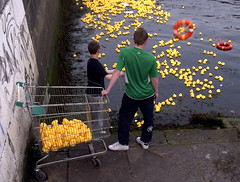Blogroll
Thursday, September 27, 2007
Tuesday, September 25, 2007
The Duck's Tribunal
Monday, September 17, 2007
When A Pigeon Is Not A Pigeon

"Pigeons on the grass alas" wrote Gertrude Stein.
James Thurber wrote a retort to this in his little piece "There's An Owl In My Room". Here's a couple of extracts:
"It is neither just nor accurate to connect the word alas with pigeons. Pigeons are definitely not alas. They have nothing to do with alas and they have nothing to do with hooray (not even when you tie red, white, and blue ribbons on them and let them loose at band concerts); they have nothing to do with mercy me or isn't that fine, either. White rabbits, yes, and Scotch terriers, and blue-jays, and even hippopotamuses, but not pigeons. I happen to have studied pigeons very closely and carefully, and I have studied the effect, or rather the lack of effect, of pigeons very carefully. A number of pigeons alight from time to time on the sill of my hotel window when I am eating breakfast and staring out the window. They never alas me, they never make me feel alas; they never make me feel anything."
He goes on:
"From where I am sitting now I can look out the window and see a pigeon being a pigeon on the roof of the Harvard Club. No other thing can be less what it is not than a pigeon can, and Miss Stein, of all people, should understand that simple fact. Behind the pigeon I am looking at, a blank wall of tired gray bricks is stolidly trying to sleep off oblivion; underneath the pigeon the cloistered windows of the Harvard Club are staring in horrified bewilderment at something they have seen across the street. The pigeon is just there on the roof being a pigeon, having been, and being, a pigeon and, what is more, always going to be, too. Nothing could be simpler than that. If you read that sentence aloud you will instantly see what I mean. It is a simple description of a pigeon on a roof. It is only with an effort that I am conscious of the pigeon, but I am acutely aware of a great sulky red iron pipe that is creeping up the side of the building intent on sneaking up on a slightly tipsy chimney which is shouting its head off."
I empathise with Thurber, and I am of a like mind where pigeons are concerned, but I cannot agree with him (alas). I've come to realise that all things, pigeons included, are as alas as one finds them. I don't find much alas in pigeons, but a woman I worked with did; she hated them with all the spine-tingling horror most people reserve for hairy-jumpy spiders, bats and rats. She hated the arrogant way they assumed ownership of the streets and pavements, only lifting off at the last possible moment; the way their unclean wings whizzed past her ear. She told me how once she had had to hail a cab in a pigeon-infested area (Leicester Square, I think, where they used to be Legion). When a cab stopped she proceeded by waving her umbrella like a sword, shouting "Shoo! Shoo!" to clear the way. The smartass cabbie leaned out of his window and said: "Shoe? Sorry love, but that looks more like a brolly to me."
Sunday, September 09, 2007
'Prosperity' IS The Real Thing

I may come back later and add more, but I just wanted to put in a plug for the new Irish drama, 'Prosperity', which I watched last Monday. I was glad to see that the Saturday Irish Times gave it a thumbs up. Lenny Abrahamson (director) and Mark O’Halloran (writer) are the team who gave us 'Adam & Paul', the unfolding of a grim, blackly comic day in the life of two Dublin junkies. Beautifully written, directed, acted and edited, that film was remarkable for its quiet but relentless focus on the wanderings these two individuals. Yet, up till the very end, nothing remarkable happens; yet the whole adventure is remarkable, human in the fullest sense of the word.
My cousin, who edited 'Adam & Paul', alerted me to 'Prosperity', which she has also worked on. The first one-hour episode, like 'Adam & Paul', involved quite a bit of wandering. Subtitled 'Stacey' (the name of the main character, a teenaged mother), it follows her through her day; leaving her hostel with her baby, visiting the mall (where she gets chatted to by a friendly security man), meeting her edgy, scuzzy boyfriend Dean (the dad), getting a talking-to by her bitter but wiser sister, meeting a guy with a beat-up face ("walked into a door") who asks if he can 'borrow' one of her cans of beer... and so on.
But this run-through tells you next to nothing. The directing, script and acting are perfect. There is an unobstusiveness, a tact and clarity that make 'Prosperity' the freshest thing I have seen in ages.
It is uncomfortable to watch in places, such as the scene in the cafe where Dean kisses shy, introverted Stacey deeply and intimately for far too long. Whether this is to humiliate her or get her aroused enough that she will ask her sister to babysit for an hour so that he can fuck her, or both, is not clear. You recoil because you have been given enough time to feel Stacey's vulnerability, her carefully applied mask, a makeup of silence and indifference. But this is as things should be; we should be able to feel Stacey's discomfort here and elsewhere, such discomfort being very much a part of who she is.
Watching 'Prosperity', there is a sense of something refined, a dramatic clearing where the usual paraphernalia has been removed. The characters are given real space to move in, 3D space, living space. The framing and focus are absolutely right. There are many close-ups. We notice Stacey's jewellery, the new hair-clip she buys, which a girlfriend remarks on but which is, naturally, way off the boyfriend's radar (Dean probably wouldn't have noticed if she'd dyed her hair green).
The similarities with Ken Loach's films have been noted. Some might think it pretentious that one of the reviewers in the IT mentioned Joyce's Ulysses. But I believe it is perfectly apt: that leisurly, wandering pace, deep-focus space and time in which odd details crystalise. I was reminded of Beckett. There is the ear for demotic speech (and more importantly, demotic silence), which he and Joyce shared. There is the waiting, mirrored by the resignation waiting in the wings, the black comedy. I was also reminded of Robert Altman, especially the first film of his I saw, 'Nashville', those parallel lives converging but in no hurry to do so.
The first episode of 'Prosperity' is, truly, a work of art. I am looking forward to the next, on Monday, 9.30, RTE 2. You should be, too.
Subscribe to:
Comments (Atom)
